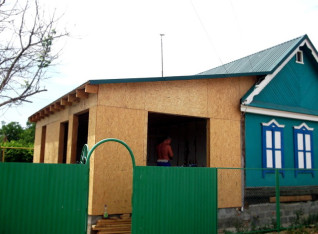Registration of the reconstruction of a residential premises in an apartment building
Residential remodelling is the process of changing or updating an existing living space to improve its functionality, comfort and appearance. This may include various works, such as changing the layout, improving finishing, replacing plumbing and electrical wiring, as well as adding new decorative elements or technological solutions.
When undertaking a residential remodel, it is important to familiarize yourself with and follow the relevant laws, regulations and rules in your area to ensure the work is legal and safe. If necessary, it is recommended that you consult with a lawyer or urban planner for further information and advice.
Legal stages of the reconstruction of an object in an apartment building
Understanding the legal stages will help you avoid violations of the law and ensure the protection of the owner's rights at every step of the renovation:
- Legal review: A lawyer can help you conduct a legal review of your property to ensure that all documents are in order and that there are no legal restrictions on the renovation.
- Permits and licenses: A lawyer can help you navigate the process of obtaining all the necessary permits and licenses for your remodel and ensure everything is done according to the law.
- Contractual relationships: A lawyer can help you draft or review contracts with contractors, architects and other professionals who will be involved in the renovation to protect your interests and make sure all terms are clear and fair.
- Dispute resolution: If disputes arise with neighbours, contractors, or other parties during a renovation, a lawyer can represent you and help resolve conflicts, including litigation if necessary.
- Consumer protection: If you hire a construction firm or other professionals to carry out the work, a lawyer can help you protect your rights as a consumer and ensure that all agreements are followed.
The legal stages of the renovation are an important component of the successful implementation of the project. From conducting a legal check and obtaining permits to protecting consumer rights - all these processes must be carefully monitored to ensure safety, compliance with legal requirements and protection of the interests of the customer.
Under what conditions can the service of reconstruction of a residential premises be provided?
In order to understand when exactly to seek help, it is important to consider the conditions under which such a service will be provided:
- Need: If you have specific questions, concerns, or challenges related to residential remodelling and require legal assistance, a service can be provided to meet those needs.
- Legality of activity: If the renovation of a residential property requires compliance with certain laws, regulations and rules, then the service may be provided to ensure compliance with the legality of the work.
- Protecting the interests of the client: If you want to ensure the protection of your rights and interests during reconstruction, then a legal assistance service may be necessary to represent your interests in interaction with other parties to the project.
- Negotiating contractual relationships: If you need to negotiate contracts with contractors, architects or other professionals involved in a renovation, a legal advisory service can be provided to protect your interests in negotiating contract terms.
Compliance with the above conditions will help avoid possible legal problems and will ensure proper documentation and processes during the work.
Under what conditions can the service of reconstruction of an apartment not be provided?

No need: If you do not have specific legal questions or problems related to residential remodelling, then the service may be unnecessary.

Illegal activities: If a residential renovation violates laws or regulations, legal aid services may be denied because they cannot be used to support illegal activities.

No contractual relationships: If you do not need to enter into contracts with or interact with third parties during the reconstruction, legal assistance may not be required.
How to independently reconstruct a residential premises?
Independent consideration of this issue is possible only by understanding and implementing the main steps of the process:
- Research the law: Start by researching the relevant laws and regulations governing residential remodelling in your area. This will allow you to understand the basic requirements and rules that need to be followed.
- Gaining insight into the process: Learn the residential remodelling process from start to finish. Understanding the stages, permits, licenses and required documents will help you plan and coordinate work.
- Finding resources and help: Use available online resources, references, and guides for residential remodelling. There you can find useful tips, document templates, example projects, etc.
- Consult with experts: Talk to professionals such as architects, building contractors or engineers for more information and advice. They can share their experiences and help clarify complex issues. Planning and Documentation: Develop a detailed remodelling plan, including budget, work schedule, materials list, and required permits. Document all stages of the process for subsequent control and accounting.
- Close monitoring of the process: Stay abreast of all changes and developments during the renovation process. Be prepared to respond to any problems or questions that may arise along the way.
- Checking the legality and quality of work: It is important to ensure that all work is carried out in accordance with the law and high quality standards. If necessary, consult with a lawyer or other specialists.
- Completion and evaluation: Once the work is completed, evaluate the results and ensure that everything is completed according to your expectations and requirements.
Independent analysis of the renovation process is possible subject to a thorough study of the legislation and regulations, as well as careful planning and control. Although this may require significant effort, the right approach will allow you to carry out the renovation within the law and without legal problems.
Frequently asked questions about the reconstruction of premises
Question
Is this building reconstruction?
Answer
Reconstruction of a building involves changing its structural and functional characteristics in order to improve or modernize it. This may include changing the layout, replacing communications, improving energy efficiency, updating the facade and other work aimed at improving the quality and comfort of life in the building.
Question
Legitimizing reconstruction, how to do it?
Answer
Legalization of reconstruction is the process of obtaining all necessary documents and permits for the legal reconstruction of a building. This usually requires obtaining a building or renovation permit from your local authority. Detailed requirements and procedures may vary by region and it is recommended that you contact your local building authority or solicitor for advice and guidance.
Question
Is it possible to reconstruct a premises in an apartment building?
Answer
Reconstruction of premises in an apartment building is possible, but requires compliance with certain rules and procedures. This usually involves obtaining the consent of neighbours and the management company, as well as compliance with technical safety and fire protection requirements.
What does the cost of the service of registration of the reconstruction of a residential premises in an apartment building depend on?
The price may depend on several key factors. Firstly, the complexity of the project - if the reconstruction requires significant changes in the structural elements of the building or violates general regulations, the process may be longer and require the involvement of additional specialists. Secondly, the need to obtain permits and approvals from the relevant authorities or co-owners of the house may also affect the cost of the service, as this may require additional costs and documents. Thirdly, the location of the object - the cost of registration may vary depending on the region, especially in large cities, where the complexity of the procedures may be higher. Finally, the qualifications and experience of the lawyer also affect the price, as more experienced specialists may charge a higher fee for their services.
ConclusionThe legal stages of reconstruction are an important component of the successful implementation of the project, which requires strict adherence to legal norms and correct documentation. Involving a qualified lawyer allows you to avoid mistakes, ensure the protection of your interests and guarantee that the entire reconstruction process will take place in accordance with the law. Careful monitoring of each stage and proper execution of all contracts and permits will help avoid legal problems and ensure the legality of the work at each stage.








































